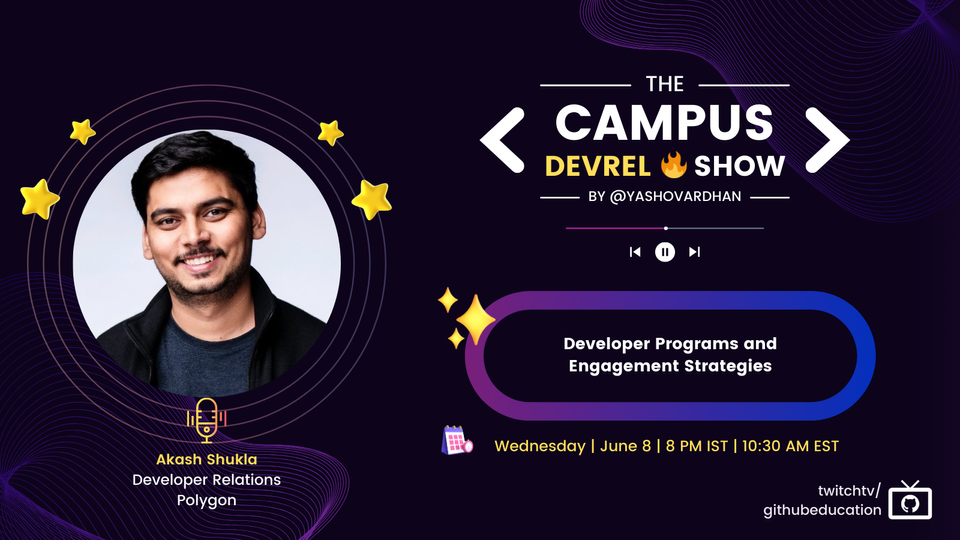Developer Programs and Engagement Strategies - Akash Shukla

In this insightful episode of The Campus DevRel Show, Akash Shukla shares his rich experience in building developer programs and crafting impactful engagement strategies for diverse communities.

Akash has been instrumental in designing and managing developer communities, and he dives into the nuances of ensuring long-term value through tailored programs that resonate with developers at all levels.
Key Insights from Akash Shukla
- Balancing Studies and Community Involvement: Akash starts by reflecting on his early days in 2011 when he juggled his college studies with community initiatives. He recalls how he sought permission from his professors to participate in external activities, even if it affected his attendance. This balance of academics and community work was challenging but rewarding, providing a solid foundation for his career in DevRel.
- Developer Program Design: Akash outlines the three key phases of developer program design: creating, engaging, and collaborating. In the create phase, Akash stresses the importance of developing digital assets and content that showcase the mission of the community. The engage phase focuses on interacting with potential developers through meetups, events, or online initiatives like "Learning Fridays." Finally, in the collaborate phase, Akash emphasizes partnering with other organizations, YouTubers, and influencers to broaden the community's reach.
- Engagement Values: When it comes to engagement, Akash believes in creating delightful experiences for participants. From thoughtful surprises to meaningful connections, he emphasizes the importance of personalizing the engagement experience for attendees. Understanding your audience’s goals and providing them with long-term value should be the top priority. Akash notes that programs should be designed with a deep understanding of the audience’s needs, background, and motivations. Metrics such as participant satisfaction, job placement rates, and recurring engagement help track the program’s effectiveness.
- The Role of Metrics: Measuring success goes beyond mere attendance numbers. Akash advises DevRel teams to track deeper metrics, such as the quality of interactions, community sentiment, and the number of active contributors. These metrics provide insight into whether the program is achieving its goals and what adjustments need to be made.
- Long-Term Community Building: Akash also highlights the difference between incentivized communities and those built on intrinsic motivation. Incentivizing participation with rewards like swag or prizes can drive short-term engagement, but the most successful communities are those that grow organically through shared goals, collaboration, and peer-to-peer learning. Communities like Wikipedia thrive because of contributors who are motivated by a shared purpose rather than external rewards.
How to Build Lasting Developer Programs
Akash delves deep into the practical steps for building developer programs that have lasting impact. He emphasizes that programs should be iterative, with feedback loops built into the process. By continuously gathering feedback from participants, programs can be refined to better meet the needs of the community. Whether through live events, webinars, or hands-on workshops, Akash stresses the importance of engagement at every stage, from onboarding to post-event follow-ups.
He also shares his experiences working with Google Developer Groups (GDGs) and other communities. These groups thrive because they focus on self-driven leadership and are designed to be accessible to developers across a wide range of skills and backgrounds. GDGs, for example, offer localized workshops and meetups that are tailored to regional languages and cultures, ensuring a personalized experience for each participant.
Engagement Strategies in Web2 vs. Web3
Akash discusses the similarities and differences between building communities in Web2 and Web3. While the core principles of understanding and engaging with your community remain the same, Web3 communities tend to move at a faster pace, with rapid project iteration and a stronger emphasis on education. Web3 communities, he notes, are also highly supportive of newcomers, with active Discord groups and bi-weekly calls that help onboard new members into the ecosystem.
Key Takeaways for Aspiring Community Builders
- Understand Your Audience: The success of any developer program or community engagement depends on understanding the unique needs and interests of your audience. Tailor your initiatives accordingly, whether you’re designing hands-on workshops for beginners or advanced technical sessions for seasoned developers.
- Create Long-Term Value: Focus on creating programs that provide long-term benefits, not just short-term excitement. Ensure that the experience is meaningful and rewarding, with clear pathways for participants to grow.
- Measure the Right Metrics: Go beyond surface-level metrics like attendance and focus on measuring deeper engagement, such as interaction quality and community sentiment.
- Foster Organic Growth: Build communities that thrive on intrinsic motivation, shared goals, and collaboration. Incentives can drive short-term results, but organic, peer-to-peer learning leads to sustainable growth.
- Iterate on Feedback: Continuously gather feedback and iterate on your programs. Engagement strategies should evolve based on participant input and changing community needs.
Conclusion
In this episode, Akash Shukla offers a masterclass in designing and executing effective developer programs and engagement strategies. His approach to building long-term value, understanding the needs of the community, and focusing on intrinsic motivation provides a valuable roadmap for anyone looking to lead successful developer communities. By focusing on personalization, feedback, and long-term engagement, Akash shows how DevRel professionals can create meaningful connections and lasting impact.

